 In every author’s life there comes a moment when they must slaughter one of their creations.
In every author’s life there comes a moment when they must slaughter one of their creations.
Yep, you’ve got to kill one of your characters.
I know, I know, you love them, you’ve created them, and yet for the sake of the story and for the sake of the reader, they need to bite a bullet, drink that poison, or succumb to cancer.
The question is how to do it well. Because there are a thousand ways to botch up a death scene — writing the pace too quickly or making it too sentimental, for instance.
What I do below is show you great examples of well written death scenes, and talk about what they’re doing well. Hope you enjoy them and learn from them.
1. Reversal Before Death
Ann Patchett, “Bel Canto”
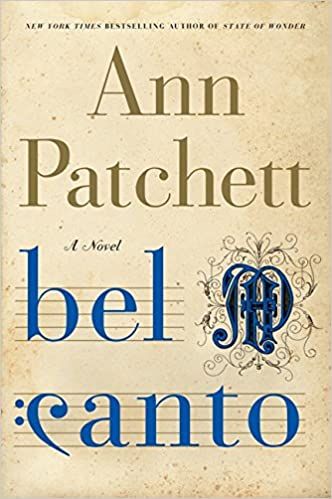
After a long hostage situation, the special forces have invaded and are killing all the hostage takers. Beatriz is holding her hands up, trying not to get shot.
“Beatriz held her hands up straight above her head and the sun hit the crystal of Gen’s watch and threw a perfect circle of light against the wall. All around her were the people she knew. There was General Hector lying on his side, his glasses gone, his shirt a soggy mess. There was Gilbert, who once she had kissed out of boredom. He was flat on his back, his arms stretched out to the sides as if he meant to fly. Then there was someone else, but that was awful. She couldn’t tell who it was. She felt afraid of them now, the people she knew. She had more in common with the strangers who were shooting because she and they were all alive. She would keep her arms the straightest of them all. That was the difference. She would do exactly what she was told and she would be spared. She closed her eyes and looked for her dark pile of sins, hoping she could release a few more on her own without the help of the priest, thinking that fewer sins would give her a lightness that these new men would recognize. But the sins were gone. She looked and looked behind the darkness of her eyelids but there was not a single sin left and she was amazed. She heard Oscar Mendoza calling her name, “Beatriz! Beatriz!” and she opened her eyes. He was coming towards her, his arms stretched out. He was running towards her like a lover and she smiled at him. Then she heard another gunshot but this time it knocked her off her feet. A pain exploded up high in her chest and spit her out of this terrible world.”
It’s wonderful that she feels forgiveness in the final moments of her life, a lifting of the weight of her sins. That’s a beautiful moment of release and freedom just before she’s accidentally shot.
It’s a good technique that shows how you can complete a character arc for a character just before their death, and that makes their death even more melancholy — the uplift of a happy moment is undercut by the sadness of death.
2. Don’t Skimp on Details
John Irving “A Prayer for Owen Meany”
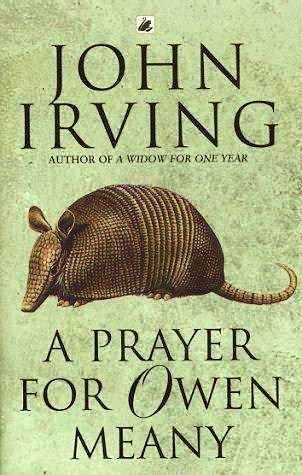
This is a complete shock of a death, even though the book has been foreshadowing it for the last forty pages. Still, it’s such an unusual death, dying from a stray baseball hit by an eleven year old. It makes it particularly poignant because her son Johnny witnesses the death. The details are particular sharp in this scene, as if it’s been etched in her son’s mind indelibly.
The crack of the bat was so unusually sharp and loud for a Little League game that the noise captured even my mother’s wandering attention. She turned her head toward home plate – I guess, to see who had hit such a shot – and the ball struck her left temple, spinning her so quickly that one of her high heels broke and she fell forward, facing the stands, her knees splayed apart, her face hitting the ground first because her hands never moved from her sides (not even to break her fall), which later gave rise to the speculation that she was dead before she touched the earth.
Whether she died that quickly, I don’t know; but she was dead by the time Mr. Chickering reached her. He was the first one to her. He lifted her head, then turned her face to a slightly more comfortable position; someone said later that he closed her eyes before he let her head rest back on the ground. I remember that he pulled the skirt of her dress down – it was as high as midthigh – and he pinched her knees together. Then he stood up, removing his warm-up jacket, which he held in front of him as a bullfighter holds his cape. I was the first of the players to cross the third-base line, but—for a fat man—Mr. Chickering was agile. He caught me, and he threw the warm-up jacket over my head. I could see nothing; it was impossible to struggle effectively.
“No, Johnny! No, Johnny!” Mr Chickering said. “You don’t want to see her, Johnny,” he said.
3. Slow Down Your Pacing
James McBride, “The Good Lord Bird”
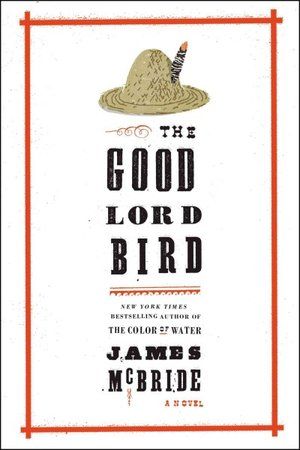
Look at the delay on this death. McBride takes his time, escalating the situation more and more, until the inevitable shot rings out and the first death of Harper’s Ferry happens (ironically, it’s a black man who died, in this attempt to free the slaves).
This is a masterclass in pacing. When you have a pivotal moment like this, don’t rush it! Slow it down. Make the reader really listen to the sound of the rifle. Here, McBride takes an entire paragraph just to describe the sound, and a whole other paragraph to describe the body’s reaction to the bullet.
Oliver spun back toward him with the rifle on his shoulder now and hissed, “Don’t take another step!”
I don’t know if the Rail Man got Oliver’s intent wrong or not, but he showed his back to Oliver. Just spun around and walked away from him, brisk-like. Oliver still had his gun trained on him, and I reckon Oliver would have let him walk back onto the train if the Rail Man had gone on and done that. But instead, the Rail Man did an odd thing. He stopped and blowed out that lantern, then, instead of walking back onto the train, turned to walk toward the railroad office, which was just a few yards off the track there. Didn’t head toward the train. Went toward the rail office. That killed him right there.
“Halt!” Oliver called out. He called it twice, and the second time he called it, the Rail Man dropped the lamp and stepped up toward the office. Double-stepped now.
God knows it, he never did wave that lantern. Or maybe he was disgusted that we wasn’t smart enough to know the password, or he just weren’t sure what was happening, but when he dropped that lantern and made toward the office, Oliver must’a figured he was going for help, so he let that Sharps speak to him. He cut loose on him once.
That Sharps rifle, them old ones during that time, they barked so loud it was a pitch. That thing choked out some fire and offered up a bang so big you could hear it echoing all along the sides of both rivers; it bounced off them mountains like a calling from on high, the sound of that boom traveling across the river and bouncing down the Appalachian valley and up the Potomac like a bowling ball. Sounded big as God’s thunder, it did, just made a terrible noise, and it busted a ball straight into the Rail Man’s back.
The Rail Man was a big man, over six hands tall. But that ball got his attention. It stood him up. He stood still a few seconds, then moved again like he wasn’t hit, kept going toward the railroad office, staggering a bit, stepping over the tracks as he done so, then collapsed at the front door of the railroad station on his face. He flopped down like a bunch of rags, his feet flopping into the air.
4. The Implied Death
Marilynne Robinson’s “Gilead”
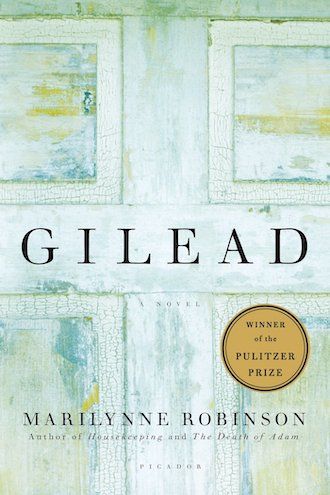
This is the very end of the book, and it’s a wonderful contrast to some of the deaths above. Many of them are violent shocks to the system, but this is an allusive, quiet death that is pointed toward but not directly shown: an old man dying in his sleep. His greatest sadness in life is his wayward son Jack, and that is the “you” he is talking to.
“I love this town. I think sometimes of going into the ground here as a last wild gesture of love—I too will smolder away the time until the great and general incandescence.
I’ll pray that you grow up a brave man in a brave country. I will pray you find a way to be useful.
I’ll pray, and then I’ll sleep.”
5. Death of a Pet
“Where the Red Fern Grows” by Wilson Rawls
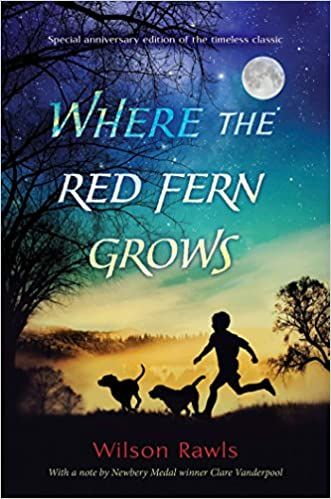
This was the first book that made me cry, and this was the scene that did it. Somehow the loss of a pet can make a person cry harder than even a person dying.
Note the extremely simple language in this scene – it’s written for young readers – yet the simplicity doesn’t take away from the depth of feeling.
“Do you think he’ll die, Papa?” I asked.
“I don’t know, Billy,” Papa said, shaking his head. “He’s lost an awful lot of blood
and he’s a mighty sick dog. All we can do now is wait and see.”
Our wait wasn’t long. My dog’s breathing grew faster and faster, and there was a
terrible rattling in his throat. I knelt down and laid his head in my lap.
Old Dan must have known he was dying. Just before he drew one last sigh, and a
feeble thump of his tail, his friendly gray eyes closed forever.
At first I couldn’t believe my dog was dead. I started talking to him. “Please don’t
die, Dan,” I said. “Don’t leave me now.”
I looked to Mama for help. Her face was as white as the bark on a sycamore tree
and the hurt in her eyes tore at my heart. She opened her mouth to say something but words
wouldn’t come out.
Feeling as cold as an arctic wind, I got up and stumbled to a chair. Mama came
over and said something. Her words were only a murmur in my ears.
Very gently Papa picked Old Dan up in his arms and carried him out on the porch.
When he came back in the house, he said, “Well, we did all we could do, but I guess it
wasn’t enough.”
6. Death Sensations
“The Sisters Brothers” by Patrick DeWitt
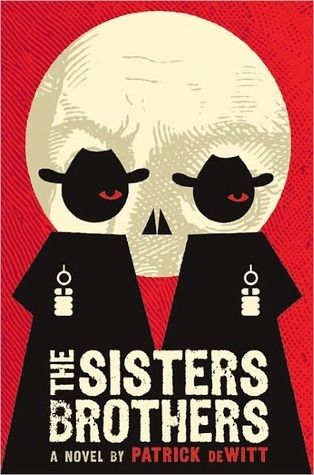
This is a Western, and after they’ve used a chemical in the water to find gold, the chemical ends up killing them. So this man knows he’s dying – nothing surprising about it.
What this scene does well is that it makes you feel the bodily sensations of a dying man. But the sound, and the feeling of the heart stopping, and the sensation of air being expelled – it’s all so visceral. You can’t ignore a death like this. It’s an intimate portrayal of death.
And I’d like to point out as well that the chapter doesn’t end on a death, which would allow the reader to stop reading, but the last line points to information just about to be revealed, which makes you hungry for the next chapter.
“I’m,” he said. “I’m.” He opened his mouth widely and there came a foreign noise from deep within his insides, as though a solid piece of him had cracked or popped. What was this? I did not think it hurt him, or at least he made no sound of pain. I held my hand to his chest and felt his heart flutter and drop. A column of air pushed from his mouth and his body lurched and grew still, and this was where the clock stopped for Hermann Kermit Warm. His right arm fell from the cot and I lifted it back up. When it fell again I felt it to hang and exited the tent. I found Charlie sitting fireside, and all was the same as when I had left him save for one conspicuous detail.
7. Death Off-Screen
Cormac McCarthy’s “Blood Meridian” (the jakes, by the way, are outhouses):
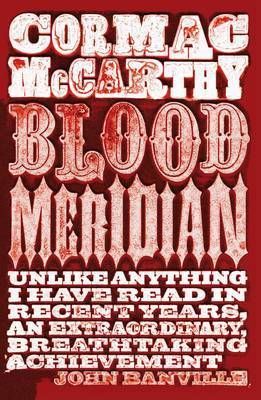 We don’t see this death — it happens off screen. The most we see of it is the reaction to men who open the door to these outhouses (they’re shocked and horrified).
We don’t see this death — it happens off screen. The most we see of it is the reaction to men who open the door to these outhouses (they’re shocked and horrified).
So McCarthy leaves what happened to the imagination of the reader, which makes the death even more horrible.
“[The kid] went down the walkboard toward the jakes. He stood outside lisetening to the voices fading away and he looked again at the silent tracks of the stars where they died over the darkened hills. Then he opened the rough board door of the jakes and stepped in.
The judge was seated upon the closet. He was naked and he rose up smiling and gathered him in his arms against his immense and terrible flesh and shot the wooden barlatch home behind him.”
8. Bittersweet Death
“Charlotte’s Web” by E.B. White
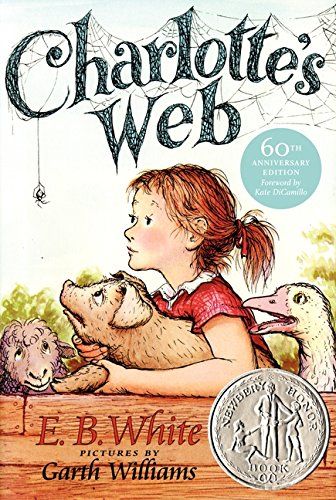
Refresher course for those of you who haven’t read this since you were ten years old: this is the end of the book when Charlotte the spider is dying.
What’s remarkable about this paragraph is the way E.B. White uses language to create a depressing scene. Think of the negative connotation of words like:
- deserted
- empty
- forlorn
- littered
- trash
- nobody
He surrounds this death scene with sad language, and that increases the emotion for the reader.
“Good-bye,” she whispered. Then she summoned all her strength and waved one of her front legs at him. She never moved again. Next day, as the Ferris wheel was being taken apart and the race horses were being loaded into vans and the entertainers were packing up their belongings and driving away in their trailers, Charlotte died. The Fair Grounds were soon deserted. The sheds and buildings were empty and forlorn. The infield was littered with bottles and trash. Nobody, of the hundreds of people that had visited the Fair, knew that a grey spider had played the most important part of all. No one was with her when she died.
9. Discovery of Dead Bodies
“The Great Gatsby” by F. Scott Fitzgerald
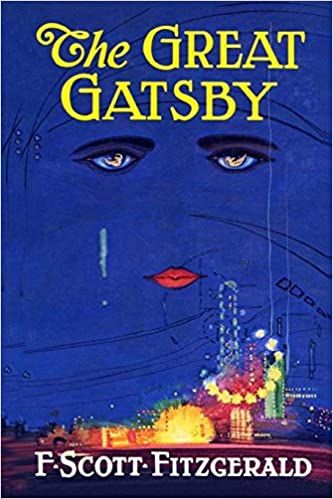
This is a murder/suicide, and a great example of a death off-screen. We don’t watch the death happen, but come upon it afterwards. Note how little Fitzgerald describes Gatsby’s body in the pool. Instead, just like McCarthy, he mostly leaves it to our imagination.
Instead, he describes the water, the mattress, the wind, the leaves, and only at the end, does he describe a circle of blood. He creates such tension by describing everything except the gruesome body the reader wants to see.
“The chauffeur—he was one of Wolfshiem’s protégés— heard the shots—afterward he could only say that he hadn’t thought anything much about them. I drove from the station directly to Gatsby’s house and my rushing anxiously up the front steps was the first thing that alarmed any one. But they knew then, I firmly believe. With scarcely a word said, four of us, the chauffeur, butler, gardener and I, hurried down to the pool.
There was a faint, barely perceptible movement of the water as the fresh flow from one end urged its way toward the drain at the other. With little ripples that were hardly the shadows of waves, the laden mattress moved irregularly down the pool. A small gust of wind that scarcely corrugated the surface was enough to disturb its accidental course with its accidental burden. The touch of a cluster of leaves revolved it slowly, tracing, like the leg of compass, a thin red circle in the water.
It was after we started with Gatsby toward the house that the gardener saw Wilson’s body a little way off in the grass, and the holocaust was complete.”
10. Death Relayed Secondhand
“A Separate Peace” by John Knowles
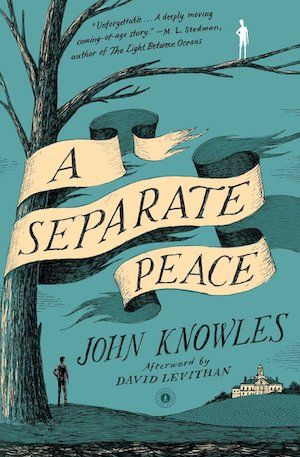
Most of you probably haven’t read this in the last twenty years, since it’s an oldie but goodie. This is another example of a death that doesn’t appear directly to the main character, but he hears about it secondhand.
Dr. Stanpole was not patrolling the corridor as he habitually did when he was not busy, so I sat down on a bench amid the medical smells and waited. After about ten minutes he came walking rapidly out of his office, his head down and his hands sunk in the pockets of his white smock. He didn’t notice me until he was almost past me, and then he stopped short. His eyes met mine carefully, and I said, “Well, how is he, sir?” in a calm voice which, the moment after I had spoken, alarmed me unreasonably.
Dr. Stanpole sat down next to me and put his capable-looking hand on my leg. “This is something I think boys of your generation are going to see a lot of,” he said quietly, “and I will have to tell you about it now. Your friend is dead.”
He was incomprehensible. I felt an extremely cold chill along my back and neck, that was all. Dr. Stanpole went on talking incomprehensibly. “It was such a simple, clean break. Anyone could have set it. Of course, I didn’t send him to Boston. Why should I?”
He seemed to expect an answer from me, so I shook my head and repeated, “Why should you?”
“In the middle of it his heart simply stopped, without warning. I can’t explain it. Yes, I can. There is only one explanation. As I was moving the bone some of the marrow must have escaped into his blood stream and gone directly to his heart and stopped it. That’s the only possible explanation. The only one. There are risks, there are always risks. An operating room is a place where the risks are just more formal than in other places. An operating room and a war.” And I noticed that his self-control was breaking up. “Why did it have to happen to you boys so soon, here at Devon?”
“The marrow of his bone …” I repeated aimlessly. This at last penetrated my mind. Phineas had died from the marrow of his bone flowing down his blood stream to his heart. I did not cry then or ever about Finny.
I did not cry even when I stood watching him being lowered into his family’s strait-laced burial ground outside of Boston. I could not escape a feeling that this was my own funeral, and you do not cry in that case.
11. Character Narrates their Own Death
“The Lovely Bones” by Alice Sebold
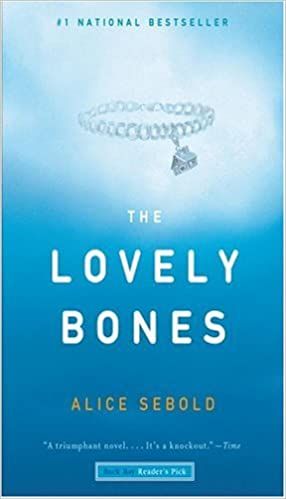
Someone narrating their own death.
I knew he was going to kill me. I did not realize then that I was an animal already dying.
“Why don’t you get up?” Mr. Harvey said as he rolled to the side and then crouched over me.
His voice was gentle, encouraging, a lover’s voice on a late morning. A suggestion, not a command.
I could not move. I could not get up.
When I would not – was it only that, only that I would not follow his suggestion? – he leaned to the side and felt, over his head, across the ledge where his razor and shaving cream sat. He brought back a knife. Unsheathed, it smiled at me, curving up in a grin.
He took the hat from my mouth. “Tell me you love me,” he said.
Gently, I did.
The end came anyway.
12. Long-Expected Death
“The Fault in our Stars” by John Green
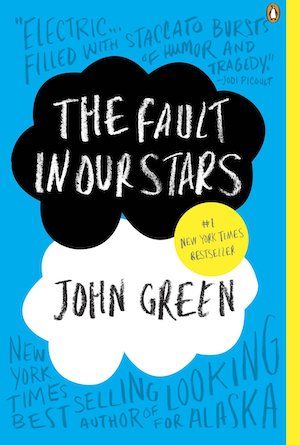
A death that is long expected in the book, and which you hear about secondhand.
Augustus Waters died eight days after his prefuneral, at Memorial, in the ICU, when the cancer, which was made of him, finally stopped his heart, which was also made of him.
He was with his mom and dad and sisters. His mom called me at three thirty in the morning. I’d known, of course, that he was going. I’d talked to his dad before going to bed, and he told me, “It could be tonight,” but still, when I grabbed the phone from the bedside table and saw Gus’s Mom on the caller ID, everything inside of me collapsed. She was just crying on the other end of the line, and she told me she was sorry, and I said I was sorry, too, and she told me that he was unconscious for a couple hours before he died. My parents came in then, looking expectant, and I just nodded and they fell into each other, feeling, I’m sure, the harmonic terror that would in time come for them directly. I called Isaac, who cursed life and the universe and God Himself and who said where are the goddamned trophies to break when you need them, and then I realized there was no one else to call, which was the saddest thing. The only person I really wanted to talk to about Augustus Waters’s death was Augustus Waters.
13. The Counter-Intuitive Death
“A Good Man is Hard to Find” by Flannery O’Connor
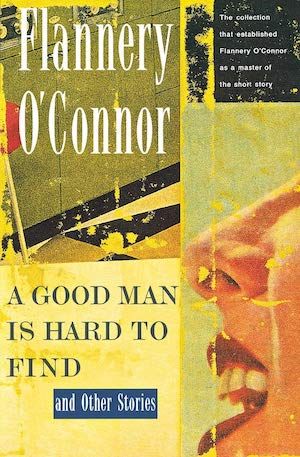
I called this counter-intuitive because in virtually every movie you see, with a showdown between two characters, death occurs when one character is threatened physically — the other character picks up the gun, or leaps for the knife.
But here you find the opposite.
The grandmother doesn’t threaten him physically, but emotionally. The instant she started to connect with him on a personal level, and show him love and affection, both verbally and through the power of touch, he feels threatened, jumps away, and shoots her.
His voice seemed about to crack and the grandmother’s head cleared for an instant. She saw the man’s face twisted close to her own as if he were going to cry and she murmured, “Why you’re one of my babies. You’re one of my own children!” She reached out and touched him on the shoulder. The Misfit sprang back as if a snake had bitten him and shot her three times through the chest. Then he put his gun down on the ground and took off his glasses and began to clean them.
Hiram and Bobby Lee returned from the woods and stood over the ditch, looking down at the grandmother who half sat and half lay in a puddle of blood with her legs crossed under her like a child’s and her face smiling up at the cloudless sky. Without his glasses, The Misfit’s eyes were red-rimmed and pale and defenseless-looking.
“Take her off and throw her where you shown the others,” he said, picking up the cat that was rubbing itself against his leg.
“She was a talker, wasn’t she?” Bobby Lee said, sliding down the ditch with a yodel.
“She would of been a good woman,” The Misfit said, “if it had been somebody there to shoot her every minute of her life.”
“Some fun!” Bobby Lee said.
“Shut up, Bobby Lee,” The Misfit said. “It’s no real pleasure in life.”
Okay, I hope you enjoyed those! Good luck perfecting your own endings, and may you kill the right character.

